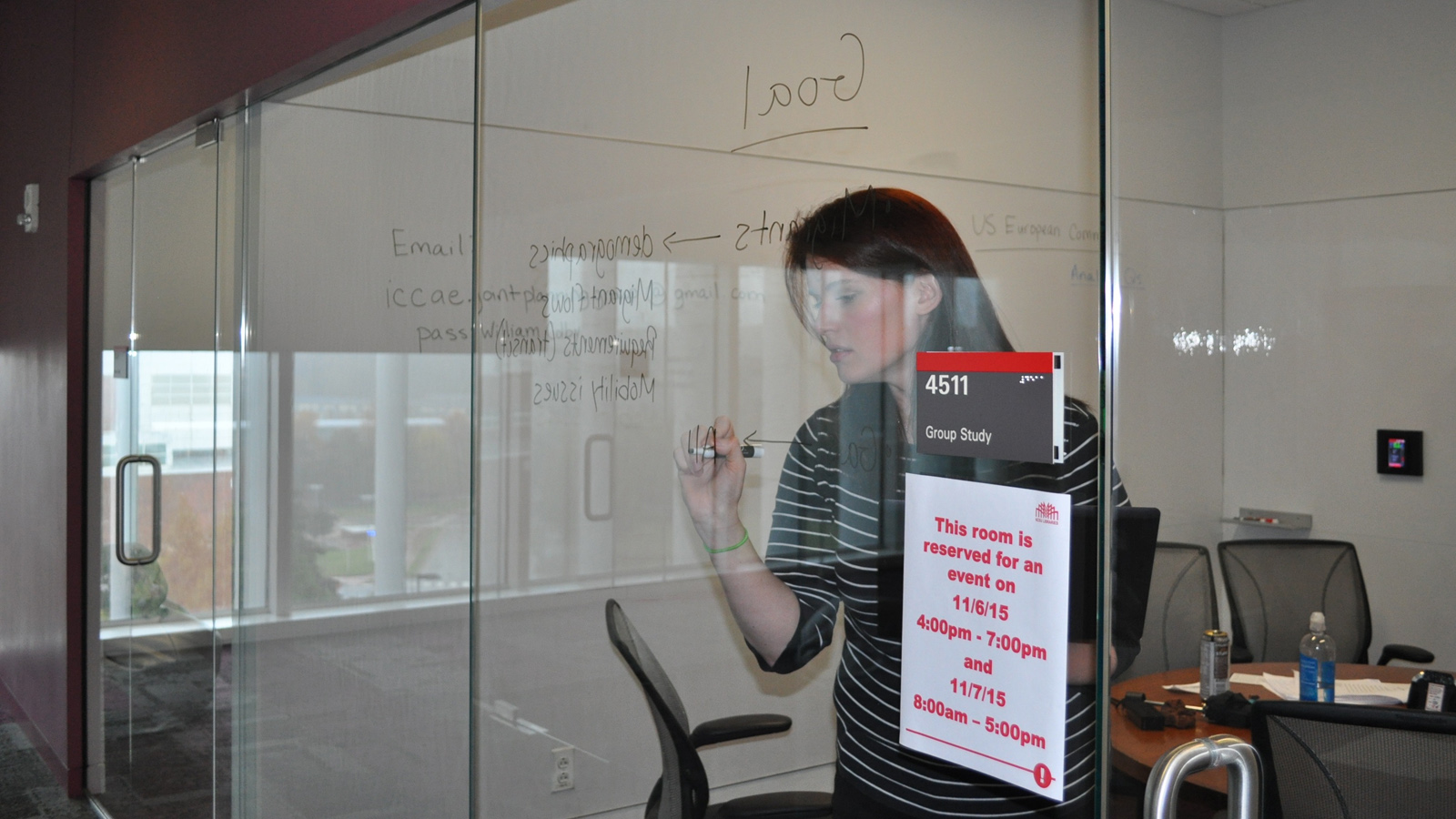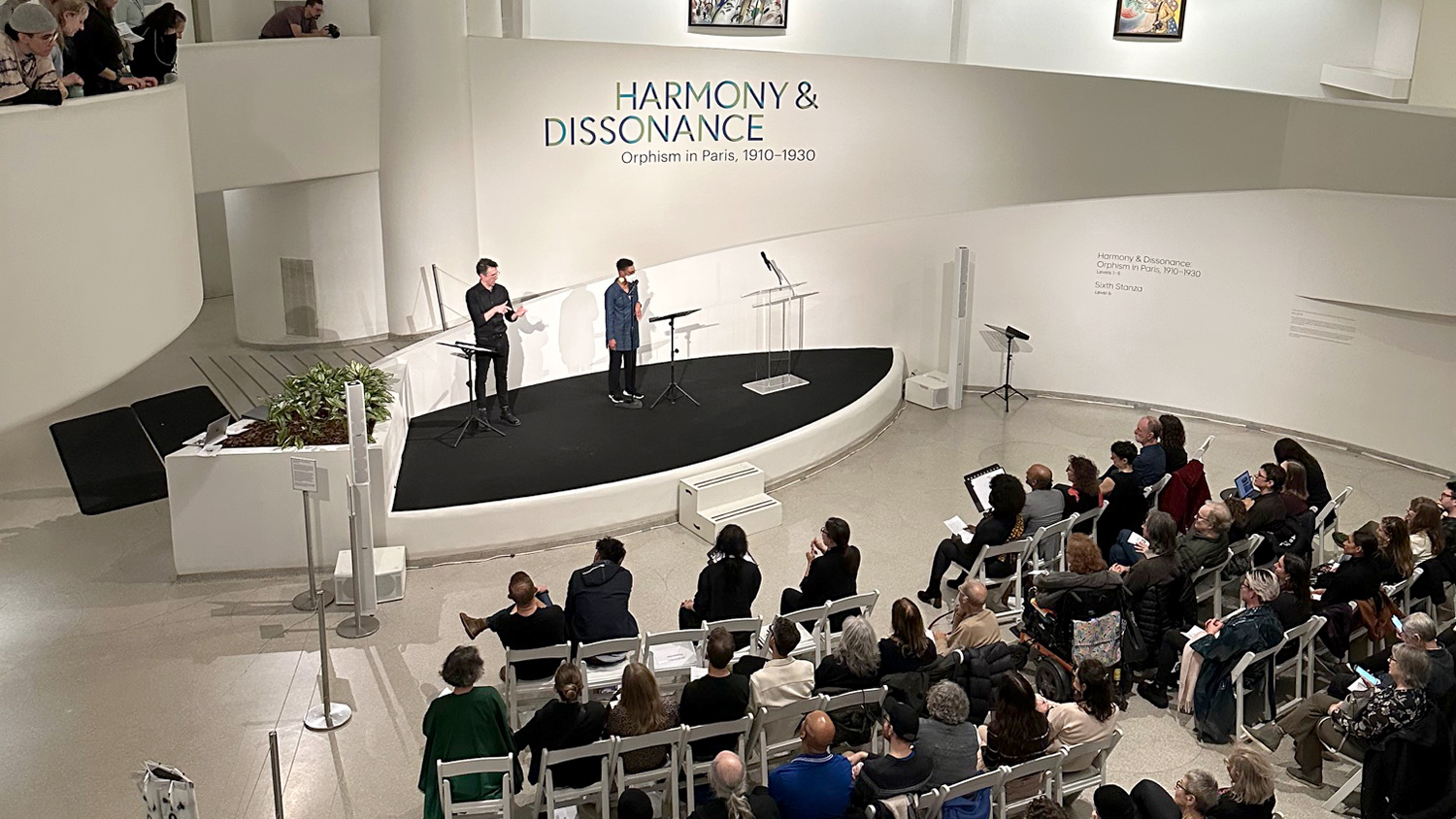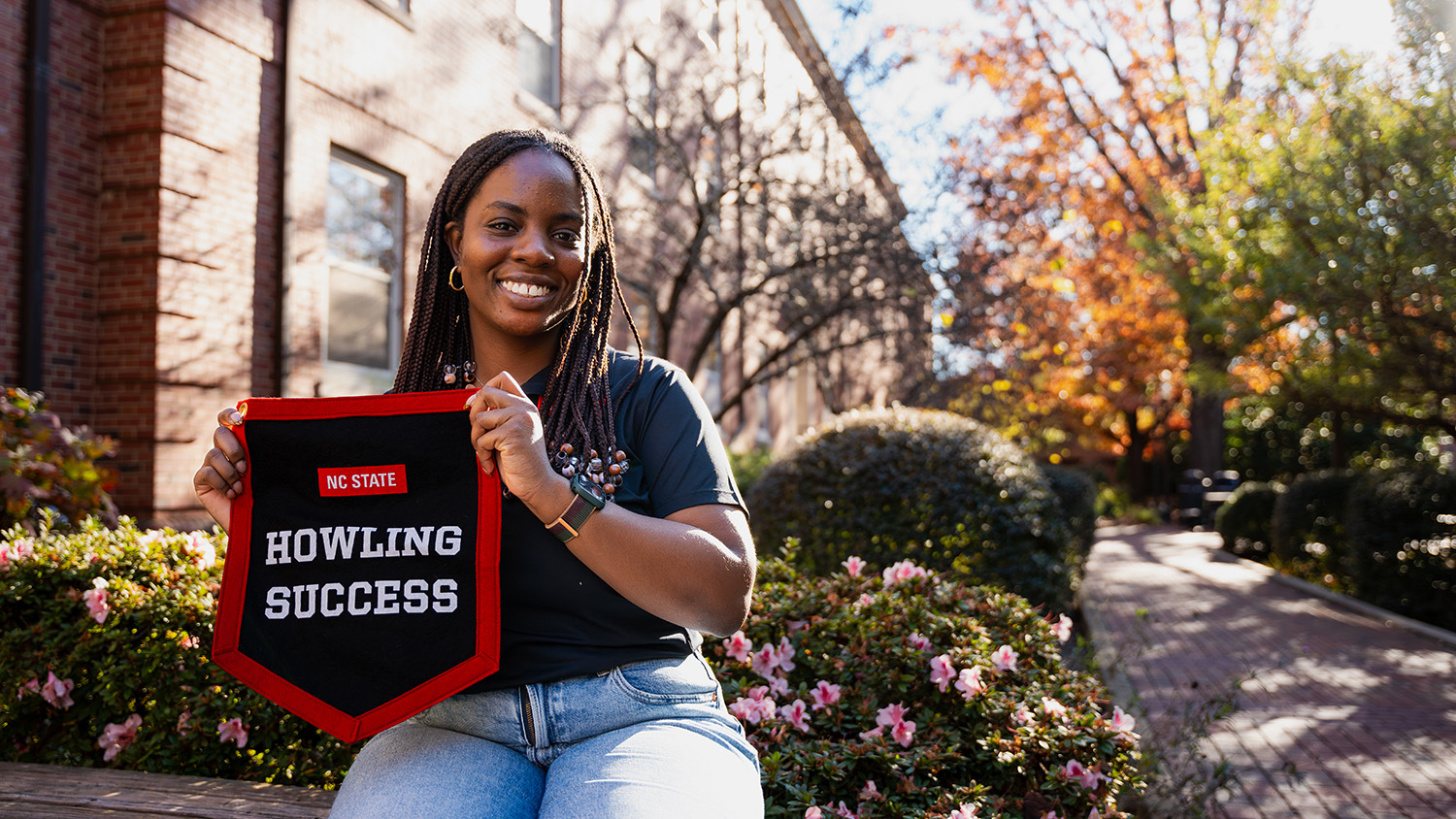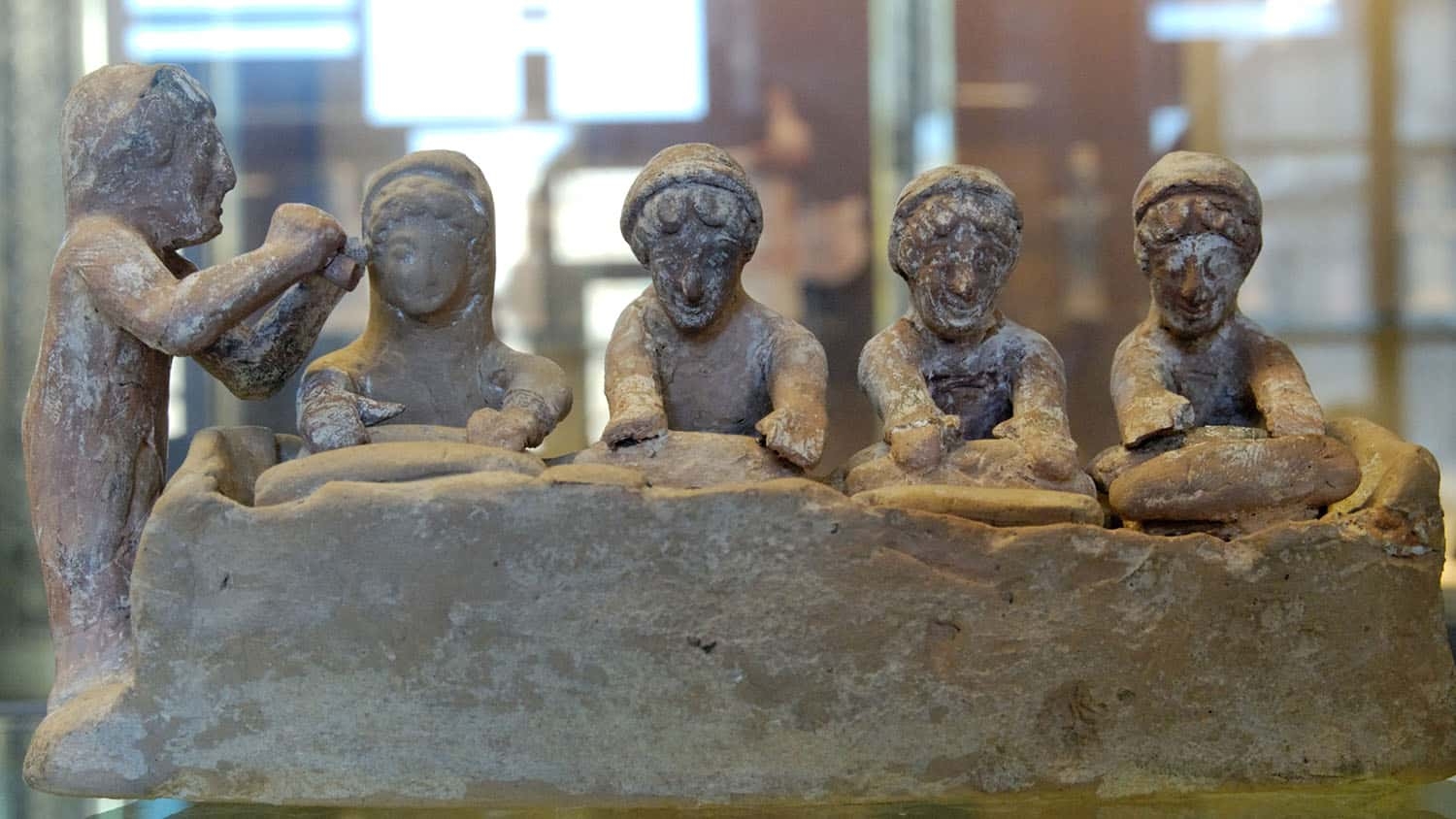Simulating Migration Crises, Rogue Vessels, Ebola Outbreaks at the Libraries

This kind of situation was among those staged in the Libraries during “Winter Is Coming,” a two-day energy and security simulation training exercise for around 50 Triangle-area university students interested in careers with intelligence agencies. Co-hosted by the Defense Intelligence Agency and Dr. William Boettcher of NC State’s Department of Political Science and School of Public and International Affairs, the November 2015 event re-created the kinds of situation rooms that a National Security Advisor runs in cases of a high-level security emergency—all in the safety of the Hunt Library’s visualization and collaboration spaces.
“It was a little disturbing because some of the things that we modeled came true,” Boettcher says. “Some of the things we anticipated in terms of backlash against refugees and terrorist attacks actually did occur. We had a South China Sea thing going on, with an American vessel headed toward Chinese waters. We had some ebola stuff, which was just kind of tailing off at that time. We sort of ripped all of these issues from the headlines, but in a systematic way.”
Students received a multimedia briefing across the screens of the Teaching and Visualization Lab on simulated situations including increased Russian activities in Ukraine and Syria and shifting energy policies throughout Europe. Then they broke into groups (‘European’ and ‘North American’ in the Hunt Library’s Creativity Studio, and a control group in a fourth floor studio) to determine which intelligence to trust and how to best move forward. After these breakaway sessions, the groups reconvened in the Teaching and Visualization Lab for presentations on their chosen strategies.

Throughout “Winter Is Coming,” student groups reported to a Chairman of the Joint Chiefs of Staff (played by Lieutenant General Dan Bolger, U.S. Army, retired, and a teaching assistant professor in NC State’s Department of History) and the Secretary of Defense (played by Ambassador David Litt, U.S. State Department, retired).
Boettcher heads the NC State chapter of the Triangle Institute for Security Studies (TISS), which includes Duke, UNC-Chapel Hill, and NC Central University. Under a grant program designed to diversify and expand the intelligence community, TISS is designated as an “intelligence community center of academic excellence.” TISS students come from a variety of academic backgrounds including political science, history, and even engineering programs.
Boettcher says that while programs like “Winter Is Coming” offer invaluable training, the primary purpose is the education of large cohorts of students in analytical skills, statistical analysis, and writing—all things one needs for careers in the intelligence sector, government agencies like the State Department and the Department of Defense, and the private sector.
The Hunt Library’s visualization and collaboration spaces allowed Boettcher to follow a real-world model of how a situation room is structured and who participates in them. This substantially enhanced the simulation for the students, who really felt the stress and rush of sorting through data and information in order to brief national leaders on possible courses of action.
“You always want the simulations to be interesting and a little playful for the students, so we picked up on the Game of Thrones idea,” Boettcher says. “We were interested in what had been going on in Crimea and the Ukraine, with the winter that was literally coming, and how that might affect refugees flooding into Europe. We used that theme of the approaching timeframe of potential crisis.”
Deploying such a crisis on a classroom whiteboard, however, doesn’t quite cut it.
“The Teaching and Visualization Lab is an amazing facility, and the Libraries staff is just awesome,” Boettcher says. “The TVL provided us with unique capabilities to blend imagery, audio, and video into collective presentations that advanced the simulation storylines in compelling ways. It was just a fabulous opportunity to get to use that and the Creativity Studio, as well as a number of the other glass-walled rooms around it to have the kind of breakout meetings we needed. Students really enjoyed it. I got uniform positive reviews.
“Probably the best endorsements came from General Bolger and an NSA analyst who both remarked on the authenticity of the simulation experience and similarity to facilities they have encountered in the real world.”
Library Technician Jason Jefferies worked with Boettcher to prepare the simulations, and stayed with the group throughout “Winter Is Coming.” His presence and expertise allowed Boettcher and the students to explore contingencies in the simulations that made them even more worthwhile for the students.

“If something was going well, we might pursue it a little further. And if something wasn’t going well, we might truncate it. It was important to have that dynamic component to the simulations, and Jason enabled that,” Boettcher says. “We also had briefings that went on in the rooms, so the students were producing intelligence products and briefing others on changing situations. Jason helped us integrate all of that into the visual presentations, essentially putting working documents up on the screens. Jason’s presence also enabled a last-minute addition to the simulation—a full-blown policy brief in the Teaching and Visualization Lab—which we could not have done ourselves.”
Boettcher saw his students pushing themselves amid the intensity of the storylines to get a taste of what a real crisis would feel like. One student, who played the role of the Deputy Director for Intelligence in a Pentagon Joint Planning Group, glowed after she rose to the occasion and led that policy brief, handling questions from Ambassador Litt and General Bolger.
“To be able to do that, and to jump over that hurdle and handle it really well, that’s valuable. It’s a bit stressful. But it’s really exciting to see a student get immersed in this activity and realize what it might be like, and then to decide if it’s a career he or she might think about,” Boettcher says.
That stress is important because the stakes of a real situation are so high. Boettcher and several former intel officers tried to replicate the flood of information into a situation room and the difficulty of discerning what’s relevant or diagnostic—called ‘sensemaking’ in the intelligence community. “We had teams sending out reports that weren’t actually part of our main narrative. The idea was to throw out red herrings and other things to see if the students could see through it to what was really going on.”
Through a collaboration with the Nuclear Engineering department, one scenario featured a special crime unit narrative about a radiation source in the city of Kiev. The students had to figure out whether it was a major threat like a dirty bomb or something harmless.
“We planted a nuclear engineering student on one of the teams,” Boettcher says, “and they had to look at a gamma spectra to figure out what the material was and whether or not it was weapons-grade. We were sending messages in Arabic and other languages. It takes a lot of work, but it’s also a lot of fun.”
The Hunt Library provided adaptable spaces for every facet of the simulation, from the informational avalanche of the situation room to the formality of the briefing room. Boettcher particularly appreciated having access to the rooms in the Institute for Emerging Issues for relaxed meals and networking between the TISS students and the practitioners who were attending.
“That provided a great opportunity for the students to talk to the ambassador and the general and the other folks involved,” he says. “I know of no facility other than the Hunt Library that could have met all these needs. We’re proud to have set a high bar for our colleagues at Duke and UNC to match in subsequent iterations.”


